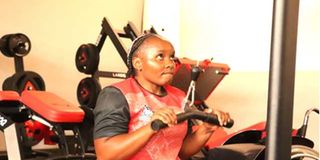Premium
Multi-sport competitions should feature both able and paralympic athletes

Powerlifter Hellen Wawira trains at the Compiegne Community Stadium in France on August 14, 2024.
What you need to know:
- Additionally, there needs to be a lot of public awareness campaigns and the media can assist a lot in this with increased coverage. As the final day of the Paralympic Games unfolds, I eagerly anticipate what the day holds in store.
- Each competition has been a celebration of human spirit, resilience, and triumph, and I look forward to witnessing more remarkable feats before the games conclude, and a future of a more inclusive sports.
As 2024 Paralympic Games come to a close today, I find myself reflecting on the incredible journey of witnessing differently-abled athletes competing at the highest level of sport.
It has been truly inspiring to see these athletes not focusing on their (dis)abilities, but rather showcasing their excellence on the world stage.
For Kenya, Samson Ojuka’s silver medal in men’s long jump T37 marks a significant achievement, underlining the country’s growing presence in adaptive sports.
His success may inspire future generations of Kenyan athletes, both differently-abled and able-bodied, to push their boundaries and pursue their dreams on the global stage.
The integration of Paralympic sports within able-bodied sports is indeed a crucial topic that can redefine the future of competitive athletics.
The Commonwealth Games have set an excellent example by blending both within a unified schedule, showcasing an inclusive approach where all athletes are celebrated equally.
Sense of unity
This creates a sense of unity, breaking down the barriers between "abled" and "differently-abled" distinctions, and highlighting that excellence in sport transcends physical attributes.
The Paralympic Games have clearly not received the hype and viewership that the Olympics got.
The international feed for TV has not been great either. To properly celebrate these athletes, maybe it is time that the international organisations consider the Commonwealth Sports approach.
This does not only promote inclusivity but also exposes broader audiences to the incredible athleticism of Paralympians.
It’s a model that encourages the sports community to recognize the similarities in dedication, training, and competition, while also respecting the unique challenges faced by each athlete.
Sports development can use various strategies to foster this integration. The ideal way to start is unified sports federations, with governance structures and support systems that integrate both sports.
Leaders in these organisations will need to prioritize inclusivity at policy level. In Kenya, it is most common that paralympic sports are governed separately.
What this can achieve is all athletes going through similar talent development pathways. Able-bodied sports might generate more resources which can then be shared in a collaborative environment.
Expertise
Para-athletes also need access to expertise and sports professionals for technique, health and injury prevention.
Government and corporate support are also critical in this development agenda, dedicating funds to ensure that infrastructure and sports development programmes are accessible to all.
National and regional multi-sport events should feature both able and paralympic athletes, allowing them to train, compete and gain recognition together.
Additionally, there needs to be a lot of public awareness campaigns and the media can assist a lot in this with increased coverage. As the final day of the Paralympic Games unfolds, I eagerly anticipate what the day holds in store.
Each competition has been a celebration of human spirit, resilience, and triumph, and I look forward to witnessing more remarkable feats before the games conclude, and a future of a more inclusive sports.
Mutuku is Secretary General of NOC-K. [email protected]





